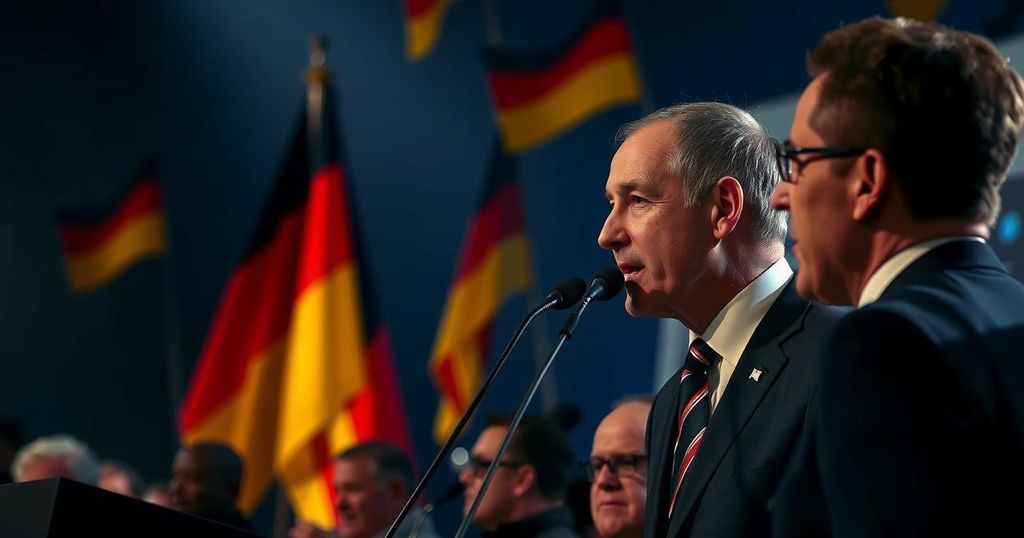Impending German Elections: Economic and Political Dynamics at Play
Germany is preparing for elections after Chancellor Olaf Scholz’s coalition collapsed due to fiscal disagreements. The CDU currently leads in polls, while the far-right AfD gains popularity. Key issues include economic stagnation, potential U.S. tariffs, and the Ukraine conflict, impacting the election’s outcome.
Germans are set to go to the polls early next year following the abrupt collapse of Chancellor Olaf Scholz’s coalition government, known as the “traffic light” coalition, which comprised the Social Democratic Party (SPD), the Greens, and the Free Democrats (FDP). This coalition, established after the 2021 elections, faced growing internal disagreements, highlighted by disputes over budgetary policies that culminated in Finance Minister Christian Lindner’s dismissal. With a vote of confidence scheduled for December 16 and a snap election expected on February 23, the political landscape in Germany is poised for significant change. The collapse was precipitated by differing fiscal priorities, as Scholz proposed suspending Germany’s stringent debt limitations while Lindner advocated for substantial budget cuts and a rollback of climate initiatives. Scholz accused Lindner of jeopardizing financial aid to Ukraine in favor of German pensioners, further straining relations within the coalition. Observers suggest this disunity has weakened Germany’s influence in the European Union at a crucial time of political uncertainty. Currently, the Christian Democratic Union (CDU) and its Bavarian counterpart hold a commanding lead in polling, with Friedrich Merz positioning himself as a strong candidate for the chancellorship. If he assumes leadership, Merz has pledged to reverse several coalition reforms, including those related to climate policy and immigration. Although Scholz intends to run for re-election, there is a growing faction within the SPD advocating for a shift in leadership, with Defence Minister Boris Pistorius as a potential successor. The election context is further complicated by the rising popularity of the far-right Alternative for Germany (AfD), which currently polls at around 20 percent, potentially affecting parliamentary dynamics even as other parties refuse to collaborate with them. The upcoming election will not only address domestic political matters but will also be influenced by crucial foreign policy issues, including the war in Ukraine and anticipated changes in American foreign policy under a possible Donald Trump presidency. Economic concerns dominate the political narrative, with Germany’s economy exhibiting stagnation amid threats of new tariffs from the United States. Economic experts are advocating for reforms to Germany’s restrictive debt brake in order to facilitate necessary public investments. There exists a pressing need for a political consensus on how to address these financial challenges effectively as the country navigates the intersection of domestic needs and international obligations.
In the wake of significant political shifts, Germany’s upcoming elections are shaped by a variety of factors including the recent collapse of the ruling coalition led by Chancellor Olaf Scholz. The coalition’s disintegration is attributed to fundamental disagreements on fiscal policies, notably between the centre-left SPD and the fiscally conservative FDP. This political turmoil emerges at a time when Germany faces economic headwinds, exacerbated by historical challenges such as the ongoing war in Ukraine and potential shifts in U.S. foreign policy under the Trump administration. As political parties realign in response to these pressures, the election results could redefine the future of Germany’s governance and its role within Europe and the global arena.
The German elections scheduled for early next year are set against a backdrop of economic stagnation and political discord, following the collapse of Chancellor Scholz’s coalition government. With leading parties realigning their strategies and public sentiment shifting towards the CDU and the AfD, the election outcome could significantly alter Germany’s domestic and international trajectory. As the political landscape continues to evolve, the challenges posed by fiscal policy, foreign relations, and economic stability will undoubtedly be at the forefront of voters’ minds.
Original Source: www.aljazeera.com




Post Comment